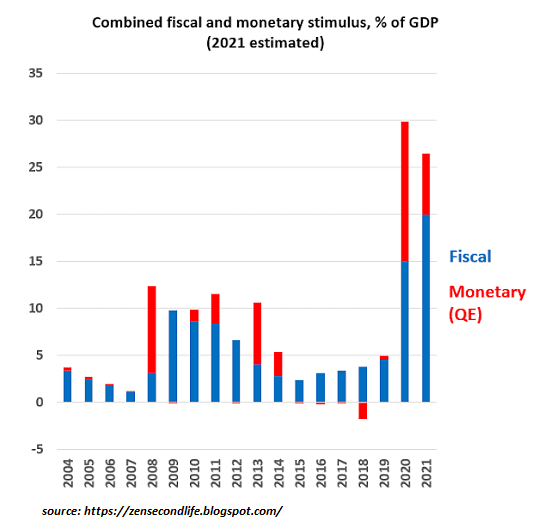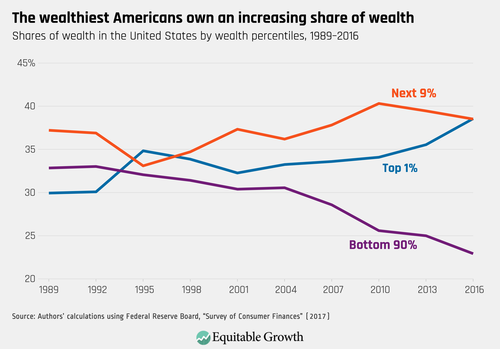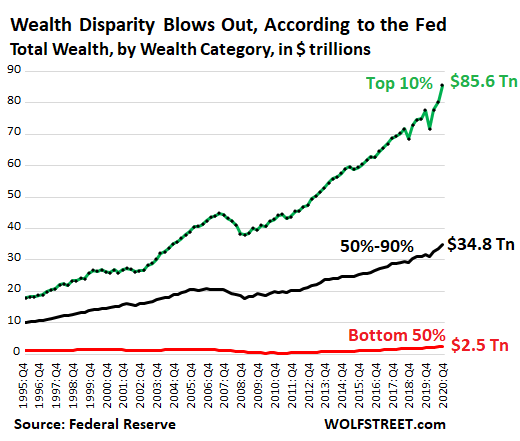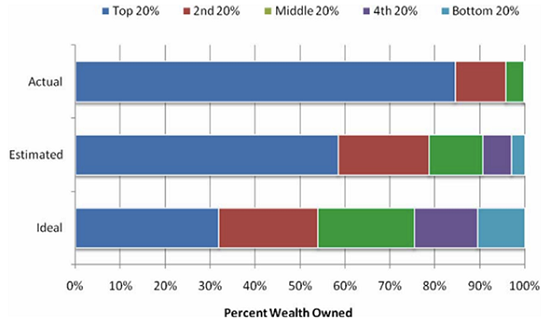The Hazardous Detour in the Road to "Recovery" Few Foresee
March 29, 2021
As the level of Fed smack and crack needed to maintain the high increases, system
fragility increases geometrically.
You know the plot point in the horror film where the highway is blocked and a detour sign
directs the car full of naive teens off onto a rutted track into the wilderness? We're right there
in the narrative of "the road to recovery": the highway that everyone expected would be smooth
and wide open is about to be detoured into a rutted track that peters out in a wilderness without
any lights or signage.
Oops--no cell coverage out here either. Is that the road over there? Guess not--we just careened
into a canyon alive with the roar of a raging river. Our vehicle keeps sliding downhill, even
with the brakes locked... this trip to "recovery" was supposed to be so quick and easy, and now
there's no way out... what's that noise?
You know the rest: the naive, trusting teens are picked off one by one in the most horrific fashion.
Substitute naive punters in the stock market and you have the script for what lies ahead.
The "recovery" has an unfortunate but all-too accurate connotation: recovery from addiction.
The "recovery" we've been told is already accelerating at a wondrous pace does not include any
treatment of the market's addiction to Federal Reserve free money for financiers; rather,
the "recovery" is entirely dependent on a never-ending speedball of Fed smack and crack
and a booster of Fed financial meth.
The addiction to Fed speedballs had already turned the
entire financial sector into a casino of lunatic junkies who delusionally believe they're all
geniuses. Beneath the illusory stability of the god-like Fed has our back,
the addiction to free money has completely destabilized America's social, political
and economic orders by boosting wealth and income inequality to unprecedented extremes.
While it's convenient to blame the carnage on the response to the Covid pandemic, the damage
to the speedball-addicted financial system had already reached extremes before the pandemic:
the addiction began decades ago, but like all addictions, the amount of stimulus needed to maintain
the high keeps expanding, and eventually the need can't be met without toxic doses: then the
junkie / addicted system collapses.
The ever-greater doses of Fed speedballs have unleashed both deflation (smack) and
inflation (crack): real returns on ordinary savings have been crushed to zero (deflation of
ordinary income), and as the cost of capital/credit have been dropped to near-zero, then
the purchasing power of wages has deflated while the speculative gains of those who own assets
have soared (asset inflation).
By lowering the cost of capital to zero, the Fed has generated fatally perverse incentives.
With the cost of capital at zero, it makes sense to buy labor-saving technologies to replace
costly labor-- labor that is costly to employers because of America's perverse sickcare
system, which burdens employers with ever-higher costs.
Not only have the Fed's free-money speedballs made it essentially free for financiers
to speculate in the stock market casino, the Fed has rigged the game and bailed out its cronies
whenever their bets soured. This has fueled infinite moral hazard: Go ahead and gamble
with free money from the Fed, and go ahead and leverage it up 10-to-1 because the Fed will bail
you out if you lose, but if you win, the stupendous gains are yours to keep.
The problem with addiction is you're dependent on the high, no matter what the eventual
consequences may be. Long-term consequences are ignored because all that matters to the
addict is to get the next Fed speedball and throw it on the gambling table to keep the high going.
Our entire economy is now dependent on ever-expanding speculative gains. Should the casino
winnings falter, our economy will crash, and given the primacy of money and consumption in our
society and political system, the financial collapse of the Fed's casino lunacy
will sweep those systems over the falls.
As the level of Fed smack and crack needed to maintain the high increases, system
fragility increases geometrically. The irony of addiction is that when the crack/meth kicks in,
the addict feels
god-like, in control, invulnerable. This artificial confidence is entirely illusory,
a deadly combination of delusion and hubris.
In this delusional state of supreme confidence, the addict loses touch with reality,
i.e. the fatal consequences of the addiction. That's the detour we've taken in becoming
addicted to the Fed's free-money speedballs.
Now the rutted road has ended in a trackless wilderness. There is no way back and no way
forward. The addict's addled confidence will push them into the ice-cold river, and
as they're swept over the falls, the realization that it was all a drug-induced delusion will
come too late to make a difference.




This essay was first published as a weekly Musings Report sent exclusively to subscribers and
patrons at the $5/month ($54/year) and higher level. Thank you, patrons and subscribers, for
supporting my work and this free blog.
If you found value in this content, please join me in seeking solutions by
becoming
a $1/month patron of my work via patreon.com.
My new book is available!
A Hacker's Teleology: Sharing the Wealth of Our Shrinking Planet
20% and 15% discounts (Kindle $7, print $17,
audiobook now available $17.46)
Read excerpts of the book for free (PDF).
The Story Behind the Book and the Introduction.
Recent Podcasts:
AxisOfEasy Salon #40: Subprime Attention NFTs (1:01 hrs) --NFTs--non-fungible tokens...
Disconnects between the Economy and the Financial Markets (FRA Roundtable, 41 min)
My COVID-19 Pandemic Posts
My recent books:
A Hacker's Teleology: Sharing the Wealth of Our Shrinking Planet
(Kindle $8.95, print $20,
audiobook $17.46)
Read the first section for free (PDF).
Will You Be Richer or Poorer?: Profit, Power, and AI in a Traumatized World
(Kindle $5, print $10, audiobook)
Read the first section for free (PDF).
Pathfinding our Destiny: Preventing the Final Fall of Our Democratic Republic
($5 (Kindle), $10 (print), (
audiobook):
Read the first section for free (PDF).
The Adventures of the Consulting Philosopher: The Disappearance of Drake
$1.29 (Kindle), $8.95 (print);
read the first chapters
for free (PDF)
Money and Work Unchained $6.95 (Kindle), $15 (print)
Read the first section for free (PDF).
Become
a $1/month patron of my work via patreon.com.
NOTE: Contributions/subscriptions are acknowledged in the order received. Your name and email remain confidential and will not be given to any other individual, company or agency.
|
Thank you, Bindu M. ($50), for your superbly generous contribution to this site -- I am greatly honored by your steadfast support and readership. |
Thank you, James S. ($5/month), for your outrageously generous contribution to this site -- I am greatly honored by your support and readership. |

|